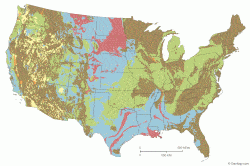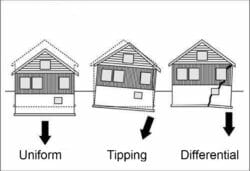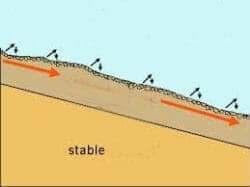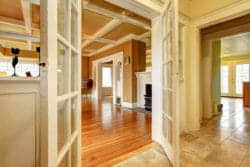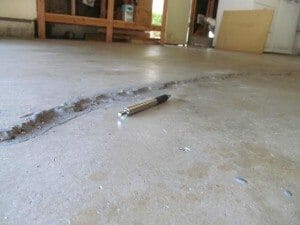Unexpected Trigger Mechanisms can cause Slope Creep & Settlement
Home » Structural » Foundation »
Homes that never had slope creep or settlement issues in the past but have started to experience symptoms of them may have been exposed to special trigger mechanisms or events.
These homes, apartment building, condominiums or high rise’s may now have geotechnical problems affecting their foundation and may experience foundation cracking or damage seemingly out of the blue. Additionally walls may start developing cracks, doors and windows may start rubbing or sticking even though they used to operate smoothly, and ceilings, floors and tiles may be cracking.
When we start seeing cracks in our foundation, sloping floors, sticking doors and windows, or drywall cracks we normally don’t think that the issues may have come from something specific. People often think instead that it must have come from long term issues or age.
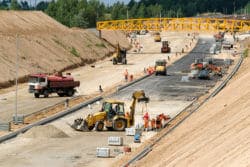
Examples of trigger mechanisms that cause soil movement
- Highway or freeway expansion or improvement projects nearby the building or home – especially when the structure is on hillsides or when a lot of excavation work has been done in the area
- A large retaining wall built near the home or building
- Subway or mass transit tunnel constructed under or nearby the property
- An underground mine collapse or mining activities
- A new home or structure built next door with a basement or a retaining wall that is near your foundation
- Major water line or sewer line break nearby
- Natural disasters or large storms such as hurricanes, floods, earthquakes, tsunamis, etc.
The main thing to keep in mind is that projects or events that have moved or relocated large amounts of soil nearby the home or building may be the catalyst for your house to settle or experience slope creep.
Timeline
The event when the soil movement occurred may have taken place a number of years ago and many people are unable to connect the event to the damage. A freeway widening project or a subway tunnel project 10 years ago are common examples that are often over looked.
Lawsuits and Settlements

Triggering events often end up in court because they are caused by other individuals, businesses, or governmental agencies which did work or projects that started the problem of soil movement. When prosecuting these types of cases, there are usually a number of experts and engineers that are called upon to do intensive investigations into the reasons for the soil movement. In depth reports are written and provided to the courts as well as testimony.
These cases tend to go on for years and end up in various settlements being reached. With the cost being so high and the length of time these cases go on, it is very difficult for a single homeowner to pursue this type of litigation. Events that are directly attributable to a neighbor excavating a deep basement right next to your foundation are often much easier to prove. Measurable settlement and the evidence of the construction by the neighbor is usually cheaper to pursue and easier to pursue.
Who to consult
When homeowners start noticing cracks and issues with their homes, they may occasionally call out a contractor or structural engineer to see if anything is wrong, what is causing the issues and if they’re serious. At times, other professionals such as geotechnical engineers or foundation engineers may be helpful in analyzing the situation.

Slope creep and settling may result in minor to major damage to a home or building. Usually slope creep or settlement is minor and creates only inconsequential problems.
When considering if there was a “Trigger Mechanism or Event” that has caused or is causing soil movement, it is wise to look well beyond your property line. Look for construction projects or events that may have triggered the soil movement.
Knowing what the root causes are is important when there are significant problems that may be costly to repair. One word of advice might be that this is a situation where you may want to think outside the box and speak with your neighbors and the local building department about your concerns.
